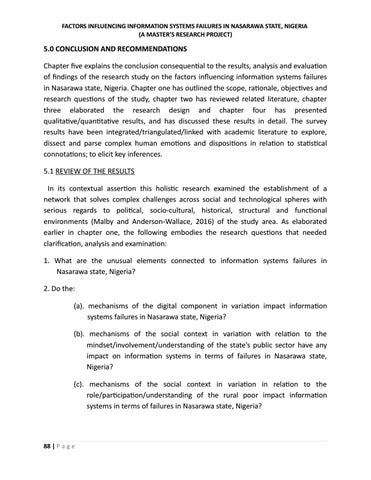FACTORS INFLUENCING INFORMATION SYSTEMS FAILURES IN NASARAWA STATE, NIGERIA (A MASTER’S RESEARCH PROJECT)
5.0 CONCLUSION AND RECOMMENDATIONS Chapter five explains the conclusion consequential to the results, analysis and evaluation of findings of the research study on the factors influencing information systems failures in Nasarawa state, Nigeria. Chapter one has outlined the scope, rationale, objectives and research questions of the study, chapter two has reviewed related literature, chapter three elaborated the research design and chapter four has presented qualitative/quantitative results, and has discussed these results in detail. The survey results have been integrated/triangulated/linked with academic literature to explore, dissect and parse complex human emotions and dispositions in relation to statistical connotations; to elicit key inferences. 5.1 REVIEW OF THE RESULTS In its contextual assertion this holistic research examined the establishment of a network that solves complex challenges across social and technological spheres with serious regards to political, socio-cultural, historical, structural and functional environments (Malby and Anderson-Wallace, 2016) of the study area. As elaborated earlier in chapter one, the following embodies the research questions that needed clarification, analysis and examination: 1. What are the unusual elements connected to information systems failures in Nasarawa state, Nigeria? 2. Do the: (a). mechanisms of the digital component in variation impact information systems failures in Nasarawa state, Nigeria? (b). mechanisms of the social context in variation with relation to the mindset/involvement/understanding of the state’s public sector have any impact on information systems in terms of failures in Nasarawa state, Nigeria? (c). mechanisms of the social context in variation in relation to the role/participation/understanding of the rural poor impact information systems in terms of failures in Nasarawa state, Nigeria?
88 | P a g e



